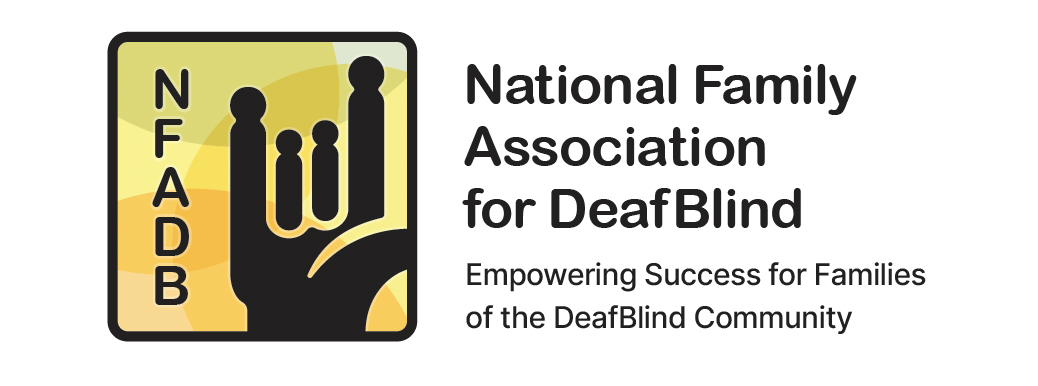- Welcome
- FL: Patti McGowan
PATTI MCGOWAN (PENNSYLVANIA)
October 2014

I live with my husband and three children in a community outside of Pittsburgh, Pennsylvania. Our youngest son, Hunter, is 18 years old and is deaf-blind with a diagnosis of Usher syndrome type II. I work as a Family Consultant with the Pennsylvania Deaf-Blind Initiative and volunteer as a board member and secretary for NFADB. From the time Hunter was born, I have had opportunities to learn and practice my parent leadership skills. I have participated in leadership training, networked with other family members and professionals, and gotten involved so I could apply my leadership skills.
From kindergarten through grade 8, Hunter happily attended an approved private school called DePaul School for Hearing and Speech in Pittsburgh, Pennsylvania. The school was located about 40 minutes from our home in a neighboring county. Life was good, Hunter was thriving, and we all assumed he would remain there until he graduated from high school. Quite unexpectedly, when he was in fifth grade, I learned that the school was planning to close their high school and Hunter only had three years left before we had to make a major life transition. This is where my leadership journey kicked into high gear.
I knew that transitioning Hunter to our local school district would take a great deal of planning and commitment on everyone’s part. For the first few years, I researched, read, and talked to everyone I could think of to learn what makes a transition successful. I knew that knowledge is powerful and I had to go into this process well informed. In Hunter’s eighth grade year, I used my leadership skills to bring the new team together and set the stage for a truly collaborative team. I diplomatically asked each member, on more than one occasion, to be open and honest with me, with Hunter, and with each other about Hunter’s strengths, challenges, and needs. Each team member had to leave his or her ego at the door and come together as a blended team to make this work. For each IEP meeting I took responsibility for making sure we had an agenda to follow, a notetaker present, and a follow-up action plan to guide our next steps. I also provided cookies as an offering of gratitude to the educational team. Hunter always attended his IEP meetings. In the beginning he would just stop in and say hello. As he got older, he would stay for the meeting and interject on occasion. By the time he was in high school, he was leading his own meetings. My goal as a parent has always been to advocate for him, with him, and behind him.
Our local high school had never had a student with dual sensory impairments. One of our first hurdles was to get the school to change the label they wanted to place on him. This was important to Hunter and it would guide the type of supports offered. The school labeled him “Learning Support Needs,” but Hunter preferred to be labeled “Deaf-Blind, who needs supports in learning.” When the school learned why this was important, they obliged and changed this on his IEP.
To learn more about Hunter, several of the new team members went to DePaul to observe him in his classroom setting. The Pennsylvania Training and Technical Assistance Network (PATTAN) also administered the Supplementary Aids and Services (SaS) Consideration Toolkit, which helps teams identify the supports and services that will help a student succeed in the general education setting. Early on, the school saw that Hunter wanted very badly for this to work. Because of that, everyone on the team and in the administration wanted Hunter to succeed.
Hunter’s transition from DePaul to our local public high school was very successful. He had the supports he needed to fit in and with a lot of hard work on his part, he did well academically. His team met on a quarterly basis (as written in the IEP). I think one of the keys to a smooth transition was that we never demanded that the school or staff change, but rather we asked how we could help Hunter fit into their existing structure. Another key was consistency. Our family always did whatever we asked the school or community to do on Hunter’s behalf.
Throughout this process, I was pleasantly surprised by the fact that Hunter’s team took great pride in what they had accomplished together. People have worked very hard for Hunter, and Hunter has worked hard for them.
Hunter graduated with his senior class in June 2014. This year he is taking advantage of the public school supports to learn transportation and job-related skills. He is also taking two community college classes and advocating on his own behalf for needed supports in that setting. He plans to get his associate degree at the community college and then move on to a university for his bachelor’s degree. We’re very proud of the leadership skills that Hunter has developed over the years. He is effectively advocating for himself and he is finding his voice within the deaf-blind community.
And my next steps in leadership? This transition process helped me develop my communication, diplomacy, and advocacy skills. I’ve generalized these skills to other areas of my life and continue to grow as a family leader. For new family leaders, my few words of wisdom would be:
- Listen to your heart and take a break when you need to
- Seek opportunities to learn and practice your new skills
- Pay it forward by helping another parent

